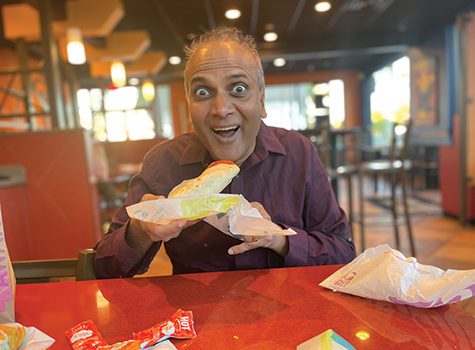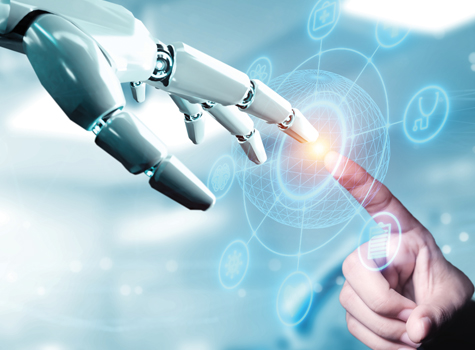By Raajeev Aggerwhil

I recently had to turn down an audition for McDonald’s because I was supposed to eat a hamburger in the commercial. I am a Hindu, and I don’t even eat meat. I thought, “What if I just eat tofu that looks like beef or a Beyond Meat burger? How would they know?” But then I realized that this is America. And you can’t have deceptive advertising here!
My agent said, “They pay really well.” I said, “I am sorry. My morals can’t be bought.” He said, “If you book it, it’s going to be a lot of money.” That put me in a dilemma. I have been a vegetarian all my life. I am also a bania. My father was a Hindu, and my mom was Jain. The reason for my vegetarian regimen is not because of religious or ethical reasons, I was just raised that way.
My dislike of meat started with aesthetics. A crushed broccoli on the road is less disgusting than a dead racoon on the highway. Growing up in Old Delhi, I would pass the butcher shops near Jama Masjid where you could see the meat processing out in the public, with fluids dripping and flies hovering around the meat. There was nothing hidden. Over a period of time, that dislike became a repulsion, eventually bordering on phobia.
I remember in seventh grade I used to go to a friend’s house in my neighborhood whose family ate meat regularly. I always avoided eating dinner at their house. However, on his birthday or at a party, I had no choice. Even their malai kofta’s resembled meat balls! I would eat them after checking several times to ensure that there was no meat. Once when I had gone to his house, he was playing with some malleable mass of gooey “stuff.” I asked him what he was doing. He said, “I am mixing spices in the meat.” Sensing my discomfort, he started teasing me and asked if I want to help him. When I made a disgusted face and backed away from him, he started bringing the mass closer to me. He played the game for several minutes while I kept escaping from him, running all over his house. Eventually, he told me he was playing with flour dough. I felt so stupid, but I wondered why would a 7th grader would be playing with such a large mass of dough – it wasn’t play-doh.
The bania in me refused to believe that a 7th grade kid could be so reckless that he would waste so much wheat flour. Even if they were not going to throw it away, it would still be unhygienic after his dirty hands had played with it.
Even after coming to the US, I did not feel the need to start eating meat. In the 80’s and 90’s while I was a student at Berkeley and later while living in the San Francisco Bay Area, there was no dearth of vegetarian food. Most restaurants in California had vegetarian options. I quickly learned that McDonald’s and possibly Burger King used beef seasoning in their French fries. I found out that most Mexican restaurants used lard in their beans and chicken broth in their rice. Also, most Thai restaurants used fish sauces in their Tom Kah Gai soup or their red tofu curries. I was sure I had eaten all these meat products but that was accidental.
When I had visited Mazatlan in Mexico with my cousin in the mid 80’s, I would not eat at a Mexican restaurant because of the fear of lard in their beans. My cousin who spoke perfect Spanish asked the owner, “¿Tiene Manteca de cardo? Does it have lard?” He said, “No, Senor.” I didn’t believe him because he answered with a bit of hesitation. I requested my cousin to ask again. “¿Usas Manteca de cardo en tus trijoles? Do you use lard in your beans?” He said, “No.” I asked my cousin to translate again, “So this burrito is vegetarian?” He said, “Si Senor!” with a smile. Then he took me inside the kitchen and showed me a large pile of corn oil containers. I was convinced. Later I told my cousin the reason for my skepticism. In the US, they cannot give a false answer for fear of getting sued. Besides a personal preference, people could have strong religious reasons or be allergic to certain foods. In Mexico, I wasn’t sure. It could be, “Chalta hai. Or Jugaad. Anything goes or Makeshift solution,” mindset like in India with little accountability.
About ten years ago, I read the importance of Omega 3 and how 60 percent of our brain is made up of Omega 3. I explored using flaxseed oil to supplement my diet. Later, through my research I found out that the suggested DHA and EPA content have to be over 1,600 mg per day. There was no way I could get that from flaxseed oil. So reluctantly, I started taking high quality Norwegian fish oil from Nordic Naturals that met this threshold in one dose. However, when I would go to Thai restaurants, I would still insist on withholding fish sauce from the soups and curries. My children would tease me and say it’s not logical. I would smile and answer, “Neither is life.”
A few years later I had seen first-hand the benefits of fish oil. When my father was 92, he had a minor stroke. Because of that and lack of physical activity, his cognitive skills rapidly declined. I encouraged the helpers to mix some fish oil in honey and give it to him. My uncle who lived in India and who would visit my father regularly remarked how my father’s verbal skills and understanding had dramatically improved. He said he could carry out an almost natural conversation with him.
All these incidents flashed through my mind while I was talking to my agent. He pushed again, saying, “Think about it before you turn down so much money.” I started evaluating my relationship with meat since childhood. Ingesting fish oil is one thing but eating beef, that too voluntarily and for profit, was a different matter. I was curious so I asked, “How much?” He said, “If it goes national and you count the residuals, it should be at least $50, 000.”
My bania instincts kicked in quickly. I said, “Sure. I’ll eat it! It is an American cow anyway.” My son always says, “They are treated like crap anyway. Watch the Discovery channel or check out PBS and you’ll see.” My agent was confused. He asked, “You wouldn’t eat a cow from India?” I told him I would never eat an Indian cow because we believe in reincarnation. They might be my ancestors. Now he was really intrigued. He asked, “How about if they paid 20 times the amount?” I said, “Sure. I’ll eat that. Every ancestor has its price.” I heard him laughing on the phone. I confessed, “Yes, my morals can be bought!”
Raajeev Aggerwhil is a Los Angeles-based comedian. Follow him on Instagram @raajeevcomedy or look for him on YouTube.



